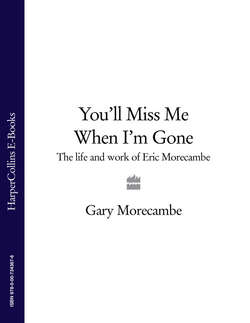Читать книгу You’ll Miss Me When I’m Gone: The life and work of Eric Morecambe - Gary Morecambe - Страница 13
‘There were times in that show I would turn to Sean and say,“Listen to that laughter because you’ll never hear it as thick again”.’
ОглавлениеAfter the play finished, Hamish and Sean did not immediately part company to pursue independent challenges. Quite quickly they went into a new stage production which reunited the whole The Play What I Wrote team of Hamish McColl, Sean Foley, Toby Jones, Kenneth Branagh (as director), and David Pugh (as producer). This was to be the maligned and ill-fated Ducktastic!
The main reason it failed, in this humble writer’s opinion, is because the title is truly dire. For my money, any play named Ducktastic! sounds more like something the Krankies would come up with. Remember them? Fandabidozi! It must, therefore, have been an uphill battle from the opening onwards—and there wasn’t too much ‘onwards’!
But Hamish McColl has his own theories. ‘I think we set the bar too high with The Play What I Wrote. The next production just didn’t catch on,’ he explained. ‘It was an expensive show to stage, and they didn’t have the time to bridge that gap between an average start and developing it into something a bit special. So it was pulled.’
My mind drifts back to the opening night of The Play What I Wrote, before Roger was ill, before Hamish and Sean misfired with Ducktastic!, and before the lovely and talented Toby Jones began scaling the heights as the big star he deserved to become (he won stunning reviews for his depiction of Truman Capote): this was the opening night of The Play What I Wrote on Broadway and it was clearly very successful with the audience, if a little confusing for the family, friends, and fans of Morecambe and Wise. At one point the names of Morecambe and Wise are replaced with those of Laurel and Hardy. Inevitably it was only what it could ever be: a goodish play well performed with a famous guest star each night. Maybe that would have been enough for Broadway if there had been no 9/11 and no war on Iraq.
The first-night party was a very New York affair—lots of money lavished upon a vast number of guests in a huge first-floor room just off Times Square—and you sensed the party meant more to the American side of the production than their British counterparts. There were paparazzi-style columns of photographers and TV news crews, and unbearably bright lights and loud, chattering voices trying to be heard through fixed Botox grins. As David Pugh pointed out, he would rather have seen the thousands of dollars they splashed out on partying go towards publicity. But that isn’t the way American backers and producers do it on Broadway. They want their party and mean to have it.
A few familiar faces were in evidence—Mel Smith (with whom I’d done a breakfast television slot some years earlier), Michael Palin, and Eddie Izzard—all of whom I liked enormously and who talked to me at length with great understanding of Morecambe and Wise.
The absence of the spirit of Morecambe and Wise—or the entire soul of the piece, as Hamish McColl puts it—from the new production was painfully emphasized by the fact that not once did the huge media contingent in attendance try to speak with my mother or show any remote interest in the London production which had generated the play’s presence on Broadway in the first place. It would be interesting to know what film-maker Steven Spielberg made of the New York production. Allegedly he was a huge fan and devotee of the original London production and instrumental in creating the Broadway opportunity.
Kevin Kline, possibly best known to British audiences as the villain in the movie A Fish Called Wanda, made a good opening-night guest star and did further nights, as did other guests, such as Liam Neeson, Meryl Streep, and Glenn Close.
The play was doing OK business until America invaded Iraq. What with the recent memory of 9/11 hanging over the country like the sword of Damocles and all Broadway productions suffering as a consequence, it was only a matter of time before audiences thinned and the first-night party was just a memory. On the fateful day of the invasion of Iraq, as the play went through its machinations, a man jumped up in the audience and shouted, ‘We’ve gone into Iraq!’, to which there was the kind of ‘Yee-hah!’ reaction that you tend to get when Americans are together in a relatively confined space. As Hamish said to me, ‘Talk about breaking the air of suspended disbelief! It took ten minutes to draw them back in.’
